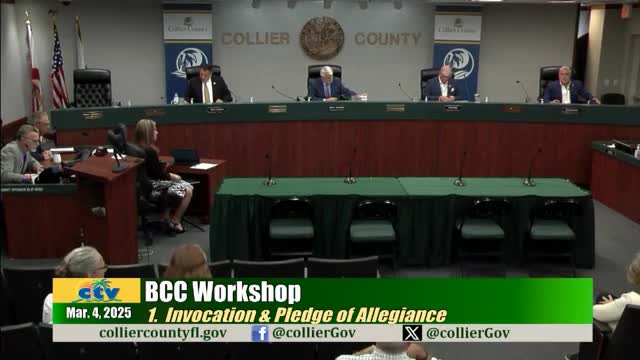Collier County staff, residents debate Clam Pass dredging, seek advisory panel and permit renewal
Get AI-powered insights, summaries, and transcripts
Subscribe
Summary
County and Pelican Bay officials described Clam Pass monitoring and permitting history and recommended waiting until after sea‑turtle season to dredge; residents urged annual dredging, independent modeling and broader stakeholder representation. The commission asked staff to return with options including an advisory committee and permit renewals.
Neil Dorril, a Pelican Bay Services Division representative, told the Collier County Board of County Commissioners at its March 4 workshop that the county's management plan and permits guide dredging at Clam Pass and that renewal of federal and state permits is underway.
Dorril said the most recent bathymetric surveys, completed in January–February, show about 10,000 cubic yards of sand in the inlet — down from a historical high of about 20,000 cubic yards when Clam Pass closed in February 2012 — and that the county’s engineers recommend waiting until the fall, after sea‑turtle nesting season, to conduct a maintenance dredge rather than rushing work now.
The discussion matters because Clam Pass is designated the county’s first Natural Resource Protection Area (NRPA) and its management plan, adopted by the Board of County Commissioners in February 2015, ties dredging permits to specific design and fill templates. Dorril said those permits historically have allowed both mechanical and occasional hydraulic dredging; the system has been dredged mechanically about seven times and hydraulically several times since the late 1990s.
“The most recent bathymetric surveys showed that there’s currently about 10,000 cubic yards of material in the system,” Dorril said. He added that the typical design dredge cut ranges between 4½ and 5½ NAVD and that the current tide range remains adequate to sustain flushing, so staff do not plan a pre‑nesting‑season hydraulic dredge.
Residents who live adjacent to Clam Pass pressed for different actions. Patrick Black, president of the Seagate Association, said residents feel they lack representation in decisions affecting the bay’s water quality and ecological health and asked the commission to create a Clam Bay advisory committee to advise the county on dredging, water quality and management.
Other residents urged more regular dredging and independent technical work. Susan Devoe, a Seagate board member, said her association funded an independent analysis by Taylor Engineering and summarized three recommendations: an annual planned dredge before the May 1 start of sea‑turtle nesting season; more consistent use of the entire allowable dredge area rather than partial cuts; and computer modeling of alternate dredge configurations, which Devoe said would cost about $75,000.
Pelican Bay and county consultants described monitoring that triggers response. Project engineer Mohammed Abis of Hamster and Moore Engineers told the commissioners the county maintains tide gauges and regular bathymetric surveys and that staff recommend intervention when measured cross‑sectional area of flow through critical sections is reduced. Jeremy Stirk, an environmental consultant, said mangrove losses since Hurricane Ian and other storms have caused localized stress but that many affected areas show recovery in year‑to‑year monitoring.
Commissioners and staff discussed short‑ and long‑term steps. Staff committed to: share the new bathymetric survey results with Seagate and Naples Cay; renew the county’s maintenance permits (staff said permit renewal is underway and that the permitting cycle now moves toward 15‑year permits, not 10); evaluate reasonable permit amendments or modeling alternatives through a formal amendment process; and examine options for sand placement templates that had been enlarged in recent permit amendments.
Chair and several commissioners signaled support for a formal advisory process. The commission asked County Manager Amy Patterson to work with the county attorney to return with an agenda item to consider forming a Clam Bay advisory committee to advise the board and Pelican Bay Services Division on water quality, dredging and ecological issues. Patterson agreed to bring back proposed language.
Residents and consultants noted points county staff said they will incorporate into follow‑up work: the importance of the NRPA and its ecological objectives, the potential role of adjacent city drainage and canal maintenance in water quality, and the tradeoffs between larger or more frequent dredges and impacts to seagrass and other regulated resources.
The commissioners did not take formal action at the workshop; the discussion concluded with direction to staff to renew existing permits, provide the recent survey results to stakeholders, and return with options for advisory body creation and technical analyses.
